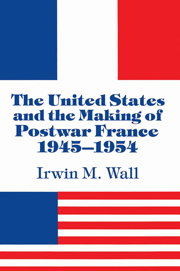Book contents
- Frontmatter
- Contents
- Acknowledgments
- List of abbreviations
- Introduction
- 1 The diplomatic heritage
- 2 The postwar years: Independence compromised
- 3 L'année terrible
- 4 Americanizing the French
- 5 Building an alliance
- 6 The Marshall Plan
- 7 Military aid and French independence
- 8 The United States and French Indochina
- 9 France declares its independence
- Conclusion
- Bibliography
- Index
1 - The diplomatic heritage
Published online by Cambridge University Press: 04 December 2009
- Frontmatter
- Contents
- Acknowledgments
- List of abbreviations
- Introduction
- 1 The diplomatic heritage
- 2 The postwar years: Independence compromised
- 3 L'année terrible
- 4 Americanizing the French
- 5 Building an alliance
- 6 The Marshall Plan
- 7 Military aid and French independence
- 8 The United States and French Indochina
- 9 France declares its independence
- Conclusion
- Bibliography
- Index
Summary
A TROUBLED LEGACY
Between 1947 and 1954 the United States and France entered into an intimate relationship characterized by unprecedented American involvement in French internal affairs. Both peoples harbored cultural stereotypes about the other, and their diplomatic legacy ill prepared them for their new relationship. Antinomies in the two cultures became exaggerated through confrontation: French Cartesianism versus American pragmatism, statism versus private initiative, centralization versus decentralization, a revolutionary myth versus a carefully cultivated myth of national consensus. The United States became the standard of modernization for most nations in the postwar era. The French blamed their traditions for their nation's relative backwardness, and were invited to internalize an American image of themselves as feudal, archaic, politically unstable, and economically stagnant, a “stalemate society.”
America's prestige and wealth did not efface a negative French image of the United States as excessively mechanized, devoted to efficiency and rationalization to the neglect of humane values, in short materialist, capitalist, and imperialist. A parallel view was that of a drab, conventional culture, devoid of individualism, “A dictatorship without a dictator, exercised by everyone over everyone else.” America was regarded as uncultured, a society of overgrown children imbued with naive optimism, a country of prag-matists devoid of theoretical understanding. Americans were convinced of their own superiority and impervious to the wisdom born of expèrience that characterized the old world.
To Americans, the French were a nation of petit bourgeois, tight fisted and cautious, characterized by cynicism and sarcasm, fickleness and intense nationalism.
- Type
- Chapter
- Information
- Publisher: Cambridge University PressPrint publication year: 1991

